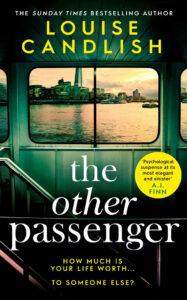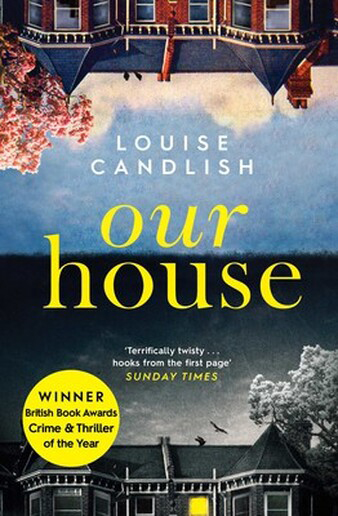Louise Candlish, The Other Passenger (2020)
Review by Lee Horsley

Louise Candlish’s The Other Passenger is a brilliant piece of contemporary noir. It offers readers sharply observed characters, an ingenious plot and a wholly engrossing succession of narrative shocks, keeping us guessing to the very end.
Candlish has written over a dozen novels, including family dramas and some of the most compelling psychological thrillers of recent years. Crimeculture always eagerly anticipates the publication of a new Candlish novel – which means that of her recent novels only The Other Passenger counts as a ‘lockdown favourite’, since we read Our House (2018) and Those People (2019) as soon as they came out.
The novel opens on the first day after the Christmas break, with Jamie, the narrator, on the riverboat that has been part of his daily commute. As he disembarks, he finds the police waiting to question him about his regular travelling companion, Kit, who has gone missing:
“‘So, if we can trouble you for a minute, Mr Buckby?’ ‘Of course.’ As I allow myself to be led towards his colleague, it’s the coy, old-style phrasing I get stuck on. Trouble you for a minute, like trouble is a passing trifle of an idea, a little Monday-morning fun. Well, as it transpires, it’s fucking neither.”
Kit and Jamie first meet on the riverboat and, as their camaraderie develops, they begin to socialize as a foursome with their partners, Melia and Clare. Clare, Jamie’s partner, has a lucrative career in property sales, and Melia, it turns out, is the new junior who has been hired by her firm. As Jamie ruefully thinks later, reflecting on the way Melia seems to have happened into their lives: “the collision of our two worlds was pure chance. Of all the estate agents in all the towns in the world, she walks into Clare’s.”

The echoes of 1940s films are one of the pleasures of The Other Passenger. Candlish mentions Double Indemnity and especially the performance of Barbara Stanwyck in her Acknowledgements, and Melia (nick-named ‘Me’) is a wonderful updating of the femme fatale for the Time’s Up era. Living in parlous circumstances, on the edge both socially and financially, she shows London properties to the very rich and craves her own path to upward mobility. As she approaches Jamie with a smoky sigh and audacious confidence, he is “swept along like some hapless antihero”, and is right to wonder what, exactly, she has in mind.
When things start to sour in the foursome, the tensions are both sexual and financial, with Clare’s spectacular, inherited four-story Georgian townhouse (boasting a view of the Thames and a private garden square) as the very embodiment of all that drives economic resentment. In one clash, when Kit rounds on Jamie, he sneers, “‘You think you’re so clever, but you haven’t got a clue in your posh bubble on Prospect Square…I know the kind of people you wouldn’t even know existed.”

When Candlish’s Our House was published, a Guardian article suggested that, given the current preoccupation with housing, it seemed inevitable that “the property-porn thriller” would become a staple of crime fiction – and indeed, both Those People and The Other Passenger are also excellent examples of “property-porn” or “London property noir”.
The escalation of the sexual-financial conflicts and betrayals in The Other Passenger involves a satisfying succession of unexpected turns and revelations, as Candlish draws us into her expertly paced plot. Suspenseful throughout, and completely addictive.
